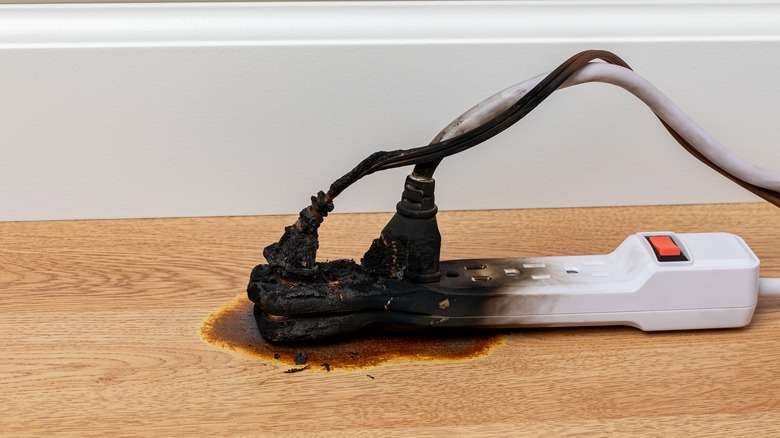If Your Home Smells Like Burnt Plastic, You Likely Have A Problem On Your Hands
Have you recently walked through your home and smelled that unpleasant, chemical smell of burnt plastic? This kind of odor can be easy to ignore or chalk up to a nearby fire or something perfunctory like a hairdryer that's been on for too long, but it can also be a sign of much bigger issues for your home. To learn why this smell happens and what it means, we spoke with Dan Mock in an exclusive interview for House Digest. Mock is the Vice President of Operations at Mister Sparky, a national electrical services provider. He emphasized just how serious the smell of burnt plastic can be, saying it can be the sign of a worn out, malfunctioning appliance sending powerful electrical surges through your home.
When surges happen, "microprocessor-based electronics can receive permanent damage in an instant," explains Mock, adding, "They may also experience cumulative damage over time from smaller surges, which can reduce device lifespan." And yes, surges can sometimes literally melt plastic, which might be what you're smelling. Beyond stinking and damaging your expensive home appliances, the consequences of power surges can be much more severe. "The resulting damage can range from a tiny bit of wear and tear on other appliances to a destructive electrical fire," says Mock.
The signs of a greater problem
In addition to that burnt plastic smell, Dan Mock says to look out for other clues that one of your appliances may be sending out dangerous power surges. "When a fizzling appliance sends a significant burst of electricity into your electrical system, your circuit breaker should trip," says Mock in an exclusive interview with House Digest. "If you weren't expecting this, a tripped circuit breaker may be your earliest sign that something is wrong," he says, explaining that, "It's also an important safety mechanism designed to prevent further electrical damage, so you shouldn't just flip the breaker back on while ignoring the root cause." Doing so, "will only create more opportunities for electrical damage," Mock states.
Instead, investigate further if your switch flips. "If you have a short circuit or a ground fault, that's a more serious problem," says Mock. "Telltale signs are scorch marks or sparking around outlets and fixtures, as well as a burning odor," which can explain that burnt plastic aroma. Mock says even if you can't spot these signs, call an electrician for any repeatedly tripping circuits.
What power surges do to the home
Dan Mock exclusively told House Digest that there are three ways faulty appliances can cause serious damage to the home: surge, physical, and fire. Surge damage can happen from power outages, as well as everyday appliances. "Appliances like air conditioners and refrigerators typically use an excess of energy when they initially switch on, sending small surges of power to other appliances on shared circuits. Faulty appliances can sometimes send much larger surges." These surges can result in damaged appliances and devices.
Physical damage is also a possible result of large power surges, and "can literally burn some electrical components, such as the delicate connectors in light switches and electrical outlets," says Mock. You can identify physical damage from surges by, "the telltale scorch marks and melted plastic." Mock recommends consulting a licensed electrician to find the source of the surge and safely replace these components.
Finally, beware of fire damage as a result of a power surge. Mock says, "In the worst-case scenario, a malfunctioning appliance will cause an electrical short that sparks a fire. These may be tiny fires that flare out on their own inside metal appliances, but depending on where they occur, they can ignite insulation, wallpaper, curtains and other materials."


